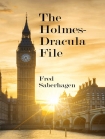A Sharpness On The Neck (Saberhagen's Dracula Book 9), Fred Saberhagen [some good books to read TXT] 📗

- Author: Fred Saberhagen
Book online «A Sharpness On The Neck (Saberhagen's Dracula Book 9), Fred Saberhagen [some good books to read TXT] 📗». Author Fred Saberhagen
My opponents on that day were neither the least nor the most skillful or brave that I had ever faced. The mere fact that their entire band had not yet broken and fled testified to their basic nerve and competence. They endeavored to get me between them, but I foiled that tactic by getting my back against a tree.
In a brief pause, before the next stage of our fight began, my nosferatu enemies bragged to me of Radu’s cleverness and power, and that they were sure they had chosen the right side in our prolonged conflict. They taunted me with the damage they had already done to me, but I could hear the hollowness of fear in everything they said.
The man I had almost killed in the old chapel boasted to me that he personally had tracked down the small peasant girl after all.
The words came out quite clearly: “She was a tasty morsel.” And he licked his lips.
My reply was also enunciated with precision: “Molesting the child was a serious mistake. I made it clear to you that she was under my protection.”
Having issued that indictment, as it were, I paused, the better to concentrate on the next exchange of blows and thrusts. One as experienced in combat as I was could sense a difference in the air. My confidence that I would survive this encounter was growing fast, and that of my opponents waning with reciprocal speed. “But you have committed an even greater error just now, in telling me what you had done.”
I was far from convinced of my opponent’s truthfulness in making such a boast—but whether I believed it or not made no difference in my determination to finish the speaker off.
In the end I was forced to believe him, for he produced convincing evidence, in the form of the very talisman I had given to the child—and his trembling hand now held it out to me in a dying, taunting gesture. I snatched it away from him before he could fling it out of reach.
And then, having disposed of his last ally, in my rage I did the very worst that I knew how, in the very limited span of time available, to the pain-nerves in his guilty hand. His shrieks were deafening, but they soon ceased.
So, it was not by means of magic that he had tracked her down. How he had done so I never learned. But alas, Radu and others might have known the child’s village, even her house, before they kidnapped her.
* * *
At least I had regained the talisman, and I hastened to hang it around my neck. Now Radu and whatever force he might raise next would have to pursue their hunt for me by non-magical means alone—which restriction, I thought, would probably not deprive them of success.
Verily I would have been gasping at that moment, were my body at all dependent upon air. Swaying, I looked about me at death and destruction. The only one of my foes who was still alive was he who had earlier taken to his heels, and was by now a mile away.
Radu’s people had achieved—at considerable cost to themselves—at least one minor victory, freezing me in man-form all through the remainder of the night. Then when I came to consider the matter, I thought that they might have won much more than that; truly it began to seem to me then that my wounds were likely to prove mortal.
* * * * * *
My first instinct for survival after the fight, as I clutched at a tree branch for support, was to seek sanctuary by changing form; but I realized in time that my chance of getting through a day in mist-form would be zero instead of only vanishingly small. I could recall how more than one old colleague of mine had perished, changing into mist-form when seriously hurt, and being blown to nothingness by a mere passing breeze.
I thought that in wolf-form I was not likely to fare much better. A wounded man might obtain help at a farmhouse, might find some place indoors to shelter from the sun. A wounded bat or wolf would certainly not. Aerial flight, and also the speed of a four-legged run, were going to be denied him, at least until he had had some chance to rest and heal.
Looking at the red ruin around me, I scorned to refresh myself with the blood of any of my breathing attackers. One reason was that doing so might have made it easier for my enemies’ magic to follow my trail. Another and perhaps stronger reason was that my pride had soared with the heat of combat, and I assured myself that I was not that hungry.
Remembering the man who had chosen to run away, I told myself that even in my wounded condition I would have had a good chance of running the coward down. But the effort would surely have completed my own exhaustion, and I thought there was nothing of much importance to be learned from him—from the beginning I had felt no doubt as to who had put the attackers on my trail—so I chose rather to concentrate instead upon my own survival.
It was fortunate that I did so.
I experienced a well-earned satisfaction at having survived Radu’s initial attack. More than that, I congratulated myself upon having won the first skirmish, diminishing the numbers in the force that was now arrayed against me. Still, as I surveyed my prospects for survival with fearless—no, not courageous, that is something else—realism, I thought that they were not good.
I meditated—quite uselessly, of course—upon the fact that I might have started to recruit an army, or at least a posse, of my own, once I knew that Radu was again above the ground.





Comments (0)